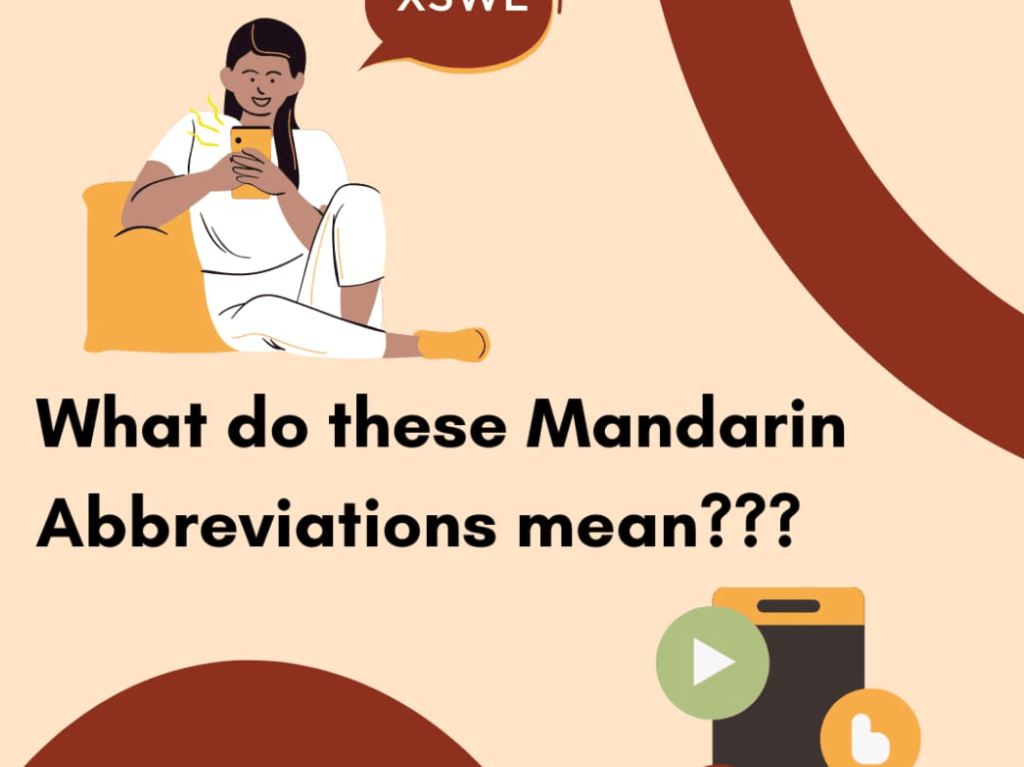Introduction
Understanding the subtleties of Mandarin negation is crucial for anyone learning the language. As a language built on nuances, Mandarin uses different words to negate actions depending on the context, time frame, and meaning. Among the most common negation words are 不 (bù) and 没 (méi), both of which are integral to forming negative statements. However, they are not interchangeable, and their correct usage can significantly alter the meaning of a sentence.
This blog aims to clarify the differences between 不 (bù) and 没 (méi), providing a detailed explanation of when and how to use each word. Whether you’re a beginner or an advanced learner, mastering these negation words will enhance your understanding of Chinese Mandarin grammar and improve your communication skills.

Overview of 不 (bù)
Definition and Basic Usage
不 (bù) is primarily used to negate actions, states, or conditions that occur in the present or future. It is a versatile negation word that plays a vital role in expressing refusal, denial, or general negation in Chinese Mandarin. Unlike 没 (méi), which is used for past actions, 不 (bù) negates something that is not happening now or will not happen in the future.
Common Scenarios for Using 不 (bù):
- Negating Habitual Actions: When you want to express that something is never done as a habit, 不 (bù) is used. For example, “I don’t drink coffee” would be “我不喝咖啡” (Wǒ bù hē kāfēi).
- General Statements: 不 (bù) is often used in general statements that negate something universally. For instance, “Sugar is not salty” would be “糖不咸” (Táng bù xián).
- Commands and Requests: When negating an imperative or giving a command, 不 (bù) is used to express that something should not be done. For example, “Don’t speak” would be “不要说话” (Bú yào shuōhuà).
Examples
Simple Sentences with 不 (bù):
- 他不来 (Tā bù lái) – He is not coming.
- 我不喜欢吃辣 (Wǒ bù xǐhuān chī là) – I don’t like eating spicy food.
- 这个问题不难 (Zhège wèntí bù nán) – This problem is not difficult.
Common Verbs and Phrases Paired with 不 (bù):
- 不要 (bù yào) – Don’t (used in commands)
- 不知道 (bù zhīdào) – Don’t know
- 不同意 (bù tóngyì) – Don’t agree
- 不想 (bù xiǎng) – Don’t want to
Exceptions
While 不 (bù) is widely used, there are certain situations where it is not appropriate. For instance, 不 (bù) is not used with the verb 有 (yǒu) to mean “do not have.” Instead, 没 (méi) is used in such contexts. Additionally, 不 (bù) is not typically used to negate completed actions, as this would require 没 (méi) to indicate that something did not happen in the past.
Overview of 没 (méi)
Definition and Basic Usage
没 (méi) is the go-to negation word for past actions and for indicating the absence of something. It is used to express that something did not happen or does not exist. Unlike 不 (bù), which is concerned with the present or future, 没 (méi) focuses on actions or states that are either completed or in the past.
Common Scenarios for Using 没 (méi):
- Negating Past Actions: When you want to say that something did not happen, 没 (méi) is used. For example, “I didn’t go to the party” would be “我没去派对” (Wǒ méi qù pàiduì).
- Expressing Non-existence: 没 (méi) is also used to indicate that something does not exist. For example, “There is no water” would be “没有水” (Méiyǒu shuǐ).
- Negating Experience: When referring to experiences that have not been had, 没 (méi) is used. For instance, “I have never been to China” would be “我没去过中国” (Wǒ méi qù guò Zhōngguó).
Examples
Simple Sentences with 没 (méi):
- 他没来 (Tā méi lái) – He didn’t come.
- 我没吃早餐 (Wǒ méi chī zǎocān) – I didn’t eat breakfast.
- 昨天没下雨 (Zuótiān méi xiàyǔ) – It didn’t rain yesterday.
Common Verbs and Phrases Paired with 没 (méi):
- 没有 (méiyǒu) – Don’t have / Didn’t have
- 没见过 (méi jiànguò) – Haven’t seen
- 没发生 (méi fāshēng) – Didn’t happen
- 没想到 (méi xiǎngdào) – Didn’t expect
没 (méi) with 有 (yǒu)
One of the most common uses of 没 (méi) is in conjunction with 有 (yǒu), forming 没有 (méiyǒu). This phrase can be translated as “do not have” or “did not have,” depending on the context. It’s important to note that 不 (bù) cannot be used with 有 (yǒu); 没有 (méiyǒu) is the correct negation.
Examples with 没有 (méiyǒu):
- 我没有钱 (Wǒ méiyǒu qián) – I don’t have money.
- 他昨天没有来 (Tā zuótiān méiyǒu lái) – He didn’t come yesterday.
- 你有没有看到我的书?(Nǐ yǒu méiyǒu kàn dào wǒ de shū?) – Did you see my book?
Key Differences Between 不 (bù) and 没 (méi)
Temporal Aspect
The primary difference between 不 (bù) and 没 (méi) lies in their temporal focus.
| 不 (bù) | 没 (méi) |
| used for present or future actions | used for past actions or to negate the existence of something. |
| Example: 不来 (bù lái) – Not coming (present or future) | Example: 没来 (méi lái) – Didn’t come (past) |
Application in Different Contexts
The choice between 不 (bù) and 没 (méi) also depends on the context of the sentence.
| 不 (bù) | 没 (méi) |
| if you are talking about a general habit or something that is universally true | If you are referring to a specific event that did not occur |
| Example: 他不喝酒 (Tā bù hējiǔ) – He doesn’t drink alcohol (general habit). | Example: 他昨天没喝酒 (Tā zuótiān méi hējiǔ) – He didn’t drink alcohol yesterday (specific past event). |
Impact on Sentence Meaning
The use of 不 (bù) versus 没 (méi) can change the meaning of a sentence significantly. Choosing the wrong negation word can lead to confusion or miscommunication.
For instance:
- 我不想去 (Wǒ bù xiǎng qù) – I don’t want to go (present intention).
- 我没去 (Wǒ méi qù) – I didn’t go (past action).
Examples of Comparative Sentences
- 不喜欢 (bù xǐhuān) – Don’t like (present or general)
- 没喜欢 (méi xǐhuān) – Didn’t like (past)
- 不买 (bù mǎi) – Don’t buy (present or command)
- 没买 (méi mǎi) – Didn’t buy (past)
- 不见 (bù jiàn) – Don’t see (present)
- 没见 (méi jiàn) – Didn’t see (past)
Common Mistakes and How to Avoid Them
Misusing 不 (bù) and 没 (méi) with the Wrong Verb
One of the most common mistakes learners make is using 不 (bù) and 没 (méi) incorrectly with verbs. This often happens when translating directly from English to Mandarin without considering the temporal aspect or context.
Example of Incorrect Usage:
- 我不去过中国 (Wǒ bù qù guò Zhōngguó) – Incorrect because 不 (bù) is used, but the sentence refers to a past experience.
- Correct: 我没去过中国 (Wǒ méi qù guò Zhōngguó) – I have never been to China.
Tips for Correct Usage
To avoid common mistakes, remember these key points:
- Use 不 (bù) for present and future actions, general statements, and commands.
- Use 没 (méi) for past actions, non-existence, and experiences.
- Remember that 没 (méi) must be used with 有 (yǒu) to negate possession or existence.
Conclusion
In summary, 不 (bù) and 没 (méi) are both essential negation words in Mandarin, each with distinct uses and implications. 不 (bù) is best for negating present or future actions, general statements, and commands, while 没 (méi) is reserved for negating past actions, existence, and experiences. By understanding the differences and practicing their usage, you can significantly improve your fluency and accuracy in Mandarin.
Start your Mandarin journey with Ni Hao Ma
To deepen your understanding of Chinese Mandarin grammar and enhance your language skills, check out our other blogs on related topics. At Ni Hao Ma, our native teachers offer expert guidance on grammar and usage, helping you master the language efficiently. Don’t miss the opportunity to learn from the best—sign up for our courses today!



